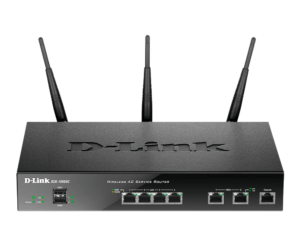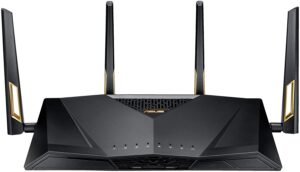Are you planning to buy a router for your business? Don’t make the mistake of choosing a consumer product based solely on ratings or price. Your company requires a robust network that can support multiple users and provide top-notch security to protect sensitive data. To make an informed decision, it’s crucial to understand the available router equipment, its features and its uses. Keep reading for a comprehensive guide to selecting the best router for your business needs.
Tips for Choosing the Perfect Wi-Fi Router for Business
#1 Think about Wi-Fi speed
Did you know a router’s speed depends on its gigabits-per-second (or Gbps) rate? Don’t confuse gigabits with gigabytes, as eight gigabits equal one gigabyte. For small offices, a router with three to five Gbps is typically sufficient, but faster options are available. Keep in mind that Wi-Fi can be used to connect to equipment inside the office and organize a local network, and not just for internet access. Buy a high throughput model with business scalability in mind.
#2 Choose models with more access control functionality
Ensure a productive work environment by minimizing social media distractions during business hours. Safeguard your business network from malicious software by investing in a router with content-filtering capabilities and backend functionality. Allow visitors to access your network securely, without compromising privacy. Choose the right router to protect your business and boost efficiency.
#3 Identifying the types of devices and applications used
When you’re choosing a router, it’s crucial to think about the devices and applications that will be using it. Do your employees use desktops or need Wi-Fi access for mobile devices and laptops? Are there any bandwidth-heavy applications like video conferencing or cloud storage? Keeping these factors in mind will help you select a router that meets your business’s unique needs. Additionally, consider the security features of the router to protect your sensitive information from cyber threats and data breaches.
You have to think ahead about how many operations and applications will be carried out with the participation of the Internet. For example, you may not know, but you can send a fax from iPhone. All you have to do is download on the Appstore and using the app, sending a fax is as easy as sending an email. If every employee periodically uses online faxing, this will already increase the load on the network, and how many more applications will be used regularly? The router should not slow down business processes and reduce staff productivity.
#4 Look for QoS and traffic prioritization
Improve your network’s performance with routers that have Quality of Service (QoS) capabilities. QoS allows you to prioritize critical data, making sure it reaches its destination faster. This feature is especially important for businesses that rely on real-time applications like VoIP and video conferencing. To get the most out of your router, choose one with customizable QoS settings that can be tailored to fit your business’s specific requirements.
#5 Choose models with easy scalability
When purchasing a router for your business, it’s important to think about its scalability and future-proofing capabilities. You don’t want to have to replace your router every time your network needs and business grows. Choose routers that offer modular expansion options, like additional ports and wireless access points, and ensure that they are compatible with emerging technologies and standards. By considering these factors, you’ll be able to select a router that meets both your current needs and future demands with ease.
#6 Correctly assess the required coverage area
When it comes to setting up Wi-Fi in your office, the size of your space matters. It’s important to choose a router with sufficient range to cover your entire workspace, whether that’s a small tenant area or an entire floor. The range of a router can be determined by its bandwidth and the number of antennas it has, with more antennas equating to greater coverage. Luckily, most router manufacturers list their devices’ coverage area in square feet, making it easy to choose the right option. For larger spaces, mesh networking, which uses multiple nodes to extend your signal across multiple rooms, can be a great option.
#7 Estimate the number of concurrent connections
If you have multiple users, a fast router isn’t very useful without enough bandwidth. Think of bandwidth like the width of a highway – the more bandwidth your router has, the more devices it can support without slowing down. Routers measure bandwidth in gigahertz (GHz) and often have multiple “bands” that vary in speed and signal strength. For example, a 2.4 GHz band has a strong signal but slower speed, while a 5 GHz band is faster but weaker. Most routers have multiple bands so you can choose the best setup for your office. Some even allow multiple bands to run simultaneously.
Conclusion
Choosing the right business router depends on many factors, from speed and coverage to security and scalability. Take your time to research all the available options before investing in one for your office. Consider your current network needs as well as any future updates or expansions you may need to make down the road. With this guide in hand, you’ll be able to select a reliable, secure and fast router for your business.







